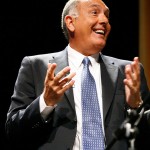
As speakers we are always being reminded that how we communicate with our audience has more to do with our body language than our words. Wherever did this idea come from? I can’t tell you how many speech training courses I’ve been to where the person running the course stood up there and said that despite the importance of public speaking 93% of our communication with an audience is done non-verbally. Ok, but how did they determine this?
Dr. Albert Mehrabian’s Study
If all of these different people are saying that nonverbal communication is more important than verbal communication, where did they get this idea from? It turns out that it all stems from the same source: Dr. Albert Mehrabian.
Dr. Mehrabian was a psychology professor at the University of California at Los Angeles. Way back in 1967 he ran a series of experiments regarding the relative importance of words vs nonverbal cues.
What happened during Dr. Mehrabian’s experiments was that a speaker would speak one word at a time and then a listener would be asked to gauge the feeling of the speaker and then if the listener liked the speaker. These studies were his findings on the inconsistent messages of feelings and attitudes.
What Dr. Mehrabian Was Really Trying To Say
Whenever we start to talk about psychology studies, things can start to get confusing very quickly. I know that I really don’t have any psychology expertise and so I try not to interpret studies like this. However, it’s pretty clear that a lot of people who provide pubic speaking instruction have had no such reservations.
Dr. Mehrabian’s experiments were never meant to measure how well the people who were listening to the speaker understood what the speaker was trying to communicate. This is a very important point because it lies at the heart of what we keep being told that our audience will never understand our words. It turns out that the experiments that people use to justify this statement really don’t support it.
The good doctor is very aware that people are misusing his research. He has said that he’s uncomfortable about the “…misquotes of his work…”. He understands that there were some very significant limitations to his findings that people seem to be glossing over. What this means for us is that we need to respect the work that Dr. Mehrabian did, but at the same time we need to realize that it really does not apply to the speeches that we give.
What All Of This Means For You
Let’s face it, nonverbal communication is one of the benefits of public speaking and is an important part of any speech that we give. However, we need to understand that the words that we speak are even more important. Just exactly how important each part of how we communicate with our audience is has been studied by Dr. Albert Mehrabian and his results are legendary.
All too often, people have taken a look at Dr. Mehrabian’s studies and they have concluded that only 7% of how we communicate with an audience has to do with the actual words that we are speaking. If you do some research and look at the actual studies that people quote when they come up with these numbers you’ll discover something different. The studies really didn’t look at how a public speaker connected with his or her audience. They were focused on other things.
It turns out that the words that we use during a speech are very important. They account for more than 7% of how we communicate with our audience. The next time that you give a speech, pick your words with care because they are a very important part of how you’ll get your message across to your audience.
– Dr. Jim Anderson
Blue Elephant Consulting –
Your Source For Real World Public Speaking Skills™
Question For You: How important do you think nonverbal communication is during a speech?
![]() Click here to get automatic updates when The Accidental Communicator Blog is updated.
Click here to get automatic updates when The Accidental Communicator Blog is updated.
P.S.: Free subscriptions to The Accidental Communicator Newsletter are now available. Subscribe now: Click Here!
Note: What we talked about are advanced speaking skills. If you are just starting out I highly recommend joining Toastmasters in order to get the benefits of public speaking. Look for a Toastmasters club to join in your home town by visiting the web site www.Toastmasters.org. Toastmasters is dedicated to helping their members to understand the importance of public speaking by developing listening skills and getting presentation tips. Toastmasters is how I got started speaking and it can help you also!
What We’ll Be Talking About Next Time
There you are: you are on stage and you are giving your speech. You are about half way through your speech when you detect that your audience is being distracted by something. Don’t they know about the importance of public speaking – they should be listening to you! You are not quite sure what it is: they seem to be looking at you, but they don’t really seem to be following you – something else has their attention. Oh my gosh, it’s your hands! Your hands have captured your audience’s attention and they are no longer focused on you! Whatever is a speaker to do?
